- Sony, The Interview and Hollywood Illusions of Creative Expression - Robin Andersen (The Vision Machine)
- SONY and the Sociology of Racism - Ezrah Aharone (Black Star News)
- North Korea/Sony Story Shows How Eagerly US Media Still Regurgitate Government Claims - Glenn Greenwald (The Intercept)
Sony, The Interview and Hollywood Illusions of Creative Expression
By Robin Andersen
December 26, 2014
The Vision Machine
The story of Sony and the hackers captured the year-end news cycle for over a month, unveiling a treasure trove of emails exposing stark flashes of the hidden underbelly of Hollywood, an industry normally aswirl in magic dust this time of year. But when the story turned from snarky digs, racism and inequity, to threats of violence against theaters, in the words of the White House press secretary, it became a "national security issue."
US officials claimed that North Korea, angered by Seth Rogan's film depicting the assassination of Kim Jung-un, was responsible for the cyber attacks against Sony, and amid threats of theater violence, enthusiasm for the film's release evaporated as potential costs added up. When Sony announced it would cancel the Christmas Day release of The Interview, President Obama chastised Sony saying the company had "made a mistake," and an earthquake of righteous indignation shook Hollywood. The NYT (12/19/14) reported that prominent members of the Hollywood community were fuming "about what they saw as failure by Sony to make a stand for artistic freedom." According to Steve Carell is was "a sad day for creative expression," and Michael Moore and Judd Apatow accused Sony of "caving to the hackers." Rob Lowe also announced it was a sign that the terrorists have won. The cancellation brought calls from celebrities, directors, producers, and critics alike to ignore threats to consumer malls where screens predominate, and as David Carr (NYT 12/22/14) put it, "Play the Movie."
And play it did. The day before Christmas Sony announced the film would be released in independent and art-house theaters, about 300 nationwide. Reported as an epic victory for freedom of expression, an NPR (ATC 12/24/14) interview with Josh Levin, the proprietor of one of the theaters showing the film, summed up the popular national narrative. Levin said, "It isn't very often, frankly, in this country that such a high profile potential abridgment of people's free expression is in the zeitgeist [that presents] an opportunity for us to all, as a country and as a people, stand up and say we will not tolerate people being bullied out of free expression."
But so many issues cloud the simple media narrative celebrating freedom, creativity, and artistic expression it's hard to know where to start.
On Christmas day filmmaker Alex Rivera (Sleep Dealer 2008) took to Facebook and offered some perspective about bullying filmmakers:
Well, THE INTERVIEW will be screened. Everyone can go back to the routine now. And, here's the simple truth: Seth Rogen's "free speech" rights were never at risk. He's starred in 67 films. His film got made and was bound to be released eventually. But.Women filmmakers (a measly 6% of directors), Latino filmmakers (a minuscule 2% of directors), Black filmmakers (a tiny 6% of directors) actually face real, constant, systemic threats to their ability to speak. Embedded in those numbers are countless filmmakers who don't get a shot.
The Interview got it's shot by blowing the head off No.1 US evil enemy Kim Jong Un, but it wasn't Rogan's creativity that came up with that plot twist. It came from the CIA. Though The Los Angeles Times reported that Seth Rogen and Evan Goldberg claimed it was their idea to have Kim Jong Un as the target, an email from Sony's senior vice president Marisa Liston, published in The Daily Beast indicated that it came from Sony through the intelligence agency. "They mentioned that it was a sony executive that told them to not use a fictitious name, but to go with kim jon-un," wrote Liston. "They mention that a former CIA agent and someone who used to work for Hilary Clinton looked at the script." Not content to interact only with the CIA, an email from Sony CEO Michael Lynton reveals that he checked with "someone very senior in State" who confidentially, gave him the go-ahead for the filmic representation of the assassination of a living head of state-the first in U.S. film history.
In addition, Sony had already censored the film by agreeing to alter certain scenes for international distribution, The Daily Beast (12/15/14) quoted emails from Nigel Clark, president of international marketing for Sony Pictures appeasing international distributors. "Have these revisions addressed any concerns you might have had regarding the over-the-top violence in the third act of the film?" Mexico, Sweden, Russia, Belgium, Brazil, and France, preferred the altered, "softer version" with Eric Brune, head of Sony Pictures in France, observing "the violent version is, I think a little bit too much for a comedy."
Sony drafted a list of detailed talking points for their executives that attempted to hide its continual shaping of the film's content: "This is a Columbia Pictures release and our parent company has little to no involvement in the creative direction taken."
But Sony's reliance on the CIA and the State Department, together with its penchant to alter film content to increase profits is nothing out of the ordinary. Blockbuster films made at major studios are required to pass the censors before they receive military support, which accounts for some of the most profitable films in Hollywood. The Pentagon and every branch of the Armed Services now help major studios shape, alter, influence and censor films for US audiences. Philip Strub is the long-time head of The DOD's Entertainment Liaison Office, and a powerful player in the movie business. When making war films, blockbusters and superheroes tales, Hollywood needs military hardware to shoot; think jets, tanks, battleships and personnel. They have no hope of getting such government largess unless they first submit their scripts to Strub, who openly admits that, "sometimes they require script changes as a condition of providing support." War films must depict military life as "realistically" as possible, or they must "inform the public" about U.S. military prowess, or assist in recruitment. Strub also explains the real goals of military/media collaborations, "any film that portrays the military as negative is not realistic to us." In fact, "The Marine Corps' film office in Los Angeles contains a floor-to-ceiling shelf of files on films that asked for assistance but were never made, "most too expensive to produce without military assistance."
In addition to vetting scripts before supplying the hardware, Strub's office carefully monitors the "creative" process once the film is in production. No on-set deviations from the content stipulations are allowed, a process that circumscribes independent improvisation or creative input that might emerge in the collaborative process that is film production.
With a budget of over four billion dollars, the DOD's PR apparatus is well funded, highly organized, and extremely influential. The public pays for these productions in many ways, mostly by footing the bill for propaganda. "Strub has been uniformly admired in Hollywood and few pictures have deviated much from the ideological consensus he fostered-patriotism, a virtuous U.S. military, glorification of battlefield exploits and masculine heroism."
The 2012 recruitment film Act of Valor represents a significant leap in the militarization of Hollywood. Originally an ad funded by the DOD, it was the first feature film to star active duty Navy SEALs. The film's themes give new life to military PR dreams of heroism, evil enemies, and terrorists who torture American agents in a plot so implausible it should be a spoof. But the film's aestheticization of war that celebrates Special Forces and the transformation of U.S. foreign policy is no laughing matter. As Jeremy Schill documents in Dirty Wars (2013), Special Forces terrorize civilians with night raids and clandestine killings. Act of Valor sanitizes those policies and is a filmic denial of the human, moral and political costs that glorify US endless wars.
In addition to reinforcing American war policies worldwide, many blockbusters are advertisements for high-tech weapons. With spectacular comic book and science fiction films, fantasy works as promotion. The DOD's and Marvel Studios created Iron Man (2008), with sequences filmed at Edwards Air Force base, where director Jon Favreau had access to "the great C17s and the Raptors and all the stuff." The result is a "blue-skies ballet" between Iron Man and the F22A Raptors, which combine forces to kill a group of Afghan terrorists modeled on Al-Qaeda. Air Force officials gloated that they came off looking like rock stars. And in Michael Bay's blockbuster Transformers, (2007) every branch of the DOD teams up with American teenagers and some good alien robots (Autobots) to do battle with bad ones (Decepticons) and save the world. The film was shot White Sands Missile Base in New Mexico. Army liaison, Lt. Col. Gregory Bishop, boasted: "As far as I know, this is the biggest joint military operation movie ever made. Even Superman now shills for the Pentagon's militainment factory. Man of Steel (2013) doubles as a fantastical advertisement for the F-35 jet, which flies its first and only mission over Smallville, Superman's hometown. In reality, the DOD's R&D on this jet is a farcical boondoggle; it was grounded due to technical difficulties, costing taxpayers $400 billion, and is projected to reach $1.5 trillion before it is done.
Don't forget that is was Sony that also brought us Zero Dark Thirty, a film collaboration with the CIA. The torture report shared the news cycle with the Sony hacking story, and it should come as no surprise that CIA Director John Brennan, gave the same specious defense for torture woven into the plot of ZD30; that torture led to information "useful" to the hunt for Osama Bin Laden.
The coverage of the cyber attacks against Sony should have prompted an examination of Hollywood's collaboration with the national security state. Instead, a celebration of freedom of expression denied that the real story of censorship in Hollywood comes from the US Armed Forces.
[Robin Andersen, Ph.D., is Professor of Communication and Media Studies at Fordham University. She is the author of 4 book and dozens of chapters and journal articles, and writes media criticism for a variety of publications. Her book, A Century of Media: A Century of War won the Alpha Sigma Nu Book Award for 2007. Her research examines the media representations of war and peace, including the rhetorical links between information and entertainment depicting war, conflict and humanitarian crisis. She co-edited the 2-volume reference book Battleground: The Media, in 2008. Her other books include Consumer Culture and TV Programming and the edited anthology Critical Studies in Media Commercialism by Oxford University Press. She often serves as a consultant for non-profit groups, and helps develop curriculum in Humanitarian Action covering strategic communication design for humanitarian organizations. She is currently guest editing a special issue of Democratic Communiqu, titled, "Media, Technology, and the Culture of Militarism: Watching, Playing and Struggling in the War Society." Her next book is titled, HBO's Treme: Evolving Stories of the Storm.]
Thanks to the author for sending this to Portside
SONY and the Sociology of Racism
By Ezrah Aharone
December 27, 2014
Black Star News
As a result of the North Korean-related hacking of Sony's computer system, certain "racist" emails of Sony executive Amy Pascal were made public. This may appear as an isolated incident of racism amongst individuals. But it offers opportunity to uniquely examine certain aspects of the "sociology of racism" that not only fester in entertainment, but extensions of this same sociology have historically led to deadly consequences in the streets of America when Black men encounter law enforcement.
By "sociology" I am simply referring to America's sum total of ethnic and cultural distinctions and exchanges; shared and conflicting beliefs, ideals, and values; common sociopolitical influences; and the human actions, ethos, and consciousness that publicly and privately shape American society, institutions, and government.
Among Pascal's emails were "jokingly racist" comments that President Obama probably liked Kevin Hart, along with the movies "12 Years A Slave", "Django", "The Butler", and "Think Like A Man". She thereafter launched an apology campaign, topped with a meeting with Al Sharpton where he scolded her about the "lack of diversity" in movies (which is inarguably relevant yet arguably impertinent to the impetus behind her comments). White House Spokesperson, Josh Earnest, said her apology was "appropriate."
But wait, Hollywood is no longer producing Sambo-like movies that cast Blacks as dimwits . . . are they? So what requires apology? Think about it...Kevin Hart can sellout just as many or more arena seats to mixed audiences as any comedian, Black or White. And every movie Pascal mentioned was a relative box-office success on its own cinematic merit.
For the record and despite "lack of diversity," "12 Years A Slave" earned $188m worldwide and won numerous awards, including Oscars for "Best Picture of the Year" and "Best Supporting Actress" by Lupita Nyong'o, who People magazine subsequently dubbed "Most Beautiful Woman in the World." "Django" had blockbuster earnings of $425m worldwide and starred former Oscar winner Jamie Foxx. "The Butler" earned $177m worldwide and starred former Oscar winner Forest Whitaker and billionaire-extraordinaire Oprah Winfrey. "Think Like A Man" earned $96m worldwide and was based on Steve Harvey's book that ranked #1 on The New York Times best seller list.
So nothing should be wrong with any president or anybody liking any of these films with decorated Black actors. After all, they grossed nearly $1billion for both Black and White people in the industry. Both Black and White people walked the red carpet. Both Black and White people applauded these stars and movies at black-tie awards. And all of the Black actors are probably on Obama's short-list of invitees to certain occasions anyway, and all have most-likely attended a White House event already.
So beyond box-office and star-power, some other veiled criteria must lurk behind the scenes of these movies that render Pascal's apology "appropriate." To wit, the unidentified elephant in the room that drips with racism, relates historically to America's unarticulated but implicitly understood "sociology of racism" that places definitively higher values on ideals, interests, and institutions that are White, Anglo, Protestant or Jewish.
In this vein, had she said that Obama or any other president "liked Tina Fey, Adam Sandler, or Seth Rogen movies," it would be a nonstory. Not because they -- or even White actors from the past -- are more talented per se than their Black contemporaries. But because there's a qualitatively greater premium that is always assigned 'increasingly' to the sophistication of White movies, the significance of White actors, and the affluence of the White audiences they draw.
So the goal of equal validation of Blacks (via diversity) is really a phantom pursuit because the goalposts are continually moved out-of-reach, in relative and incremental measure, to assure that White accomplishments signify the apex.
But it neither begins nor ends there. Understand that this sociology is 4-centuries in the making. Its implications and evidence saturate society on multiple and widespread levels, whereby a diminished worth has been historically and intrinsically equated to the Black experience as a whole . . . Black ethos, Black history, Black culture, Black leaders, Black lives. Extreme frictions from this sociology help explain existing racial tensions of why Americans of all races are now protesting nationwide against such desensitivity, while displaying placards in 1960's-fashion, stating: "Black Lives matter."
However, to enact concrete systemic change, people should be mindful of implementing a collective approach that recognizes the origin of this 400-year sociology, as opposed to protesting against its symptoms and outgrowths. But this becomes problematic because, any effort to confront the source and substance of this sociology head-on, would be viewed as too subversive. This, in consequence, would interrupt the government access and corporate revenue streams that prop-up certain Black leaders, who would then have to put a "For Sale" sign on their operations.
Whether shooting movies or shooting Black men, there are ingrained sociological and systemic elements that underlie and desensitize government and society. So within this historical unfoldment, neither Amy Pascal nor Sony is the problem, and holding meetings about diversity and police body-cams is not the solution. Hopefully though, messages like this will garner proper consideration so that Black America will not have to rely on more hackings from communist North Korea as the next best hope to prod America to become an all-inclusive democracy in the truest sense of the concept.
[Ezrah Aharone is an Adjunct Associate Professor of Political Science at Delaware State University and the author of Sovereign Evolution: Manifest Destiny from Civil Rights to Sovereign Rights and Pawned Sovereignty: Sharpened Black Perspectives on Americanization, Africa, War and Reparations. His forthcoming book The Sovereign Psyche will be published in the spring of 2015. He can be reached at www.EzrahSpeaks.com.]
Thanks to the author for sending this to Portside.
North Korea/Sony Story Shows How Eagerly US Media Still Regurgitate Government Claims
By Glenn Greenwald
January 1, 2015
The Intercept
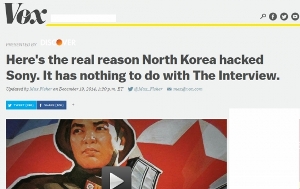
credit: The Intercept
The identity of the Sony hackers is still unknown. President Obama, in a December 19 press conference, announced: "We can confirm that North Korea engaged in this attack." He then vowed: "We will respond. . . . We cannot have a society in which some dictator some place can start imposing censorship here in the United States."
The U.S. Government's campaign to blame North Korea actually began two days earlier, when The New York Times - as usual - corruptly granted anonymity to "senior administration officials" to disseminate their inflammatory claims with no accountability. These hidden "American officials" used the Paper of Record to announce that they "have concluded that North Korea was `centrally involved' in the hacking of Sony Pictures computers." With virtually no skepticism about the official accusation, reporters David Sanger and Nicole Perlroth deemed the incident a "cyberterrorism attack" and devoted the bulk of the article to examining the retaliatory actions the government could take against the North Koreans.
The same day, The Washington Post granted anonymity to officials in order to print this:

Other than noting in passing, deep down in the story, that North Korea denied responsibility, not a shred of skepticism was included by Post reporters Drew Harwell and Ellen Nakashima. Like the NYT, the Post devoted most of its discussion to the "retaliation" available to the U.S.
The NYT and Post engaged in this stenography in the face of numerous security experts loudly noting how sparse and unconvincing was the available evidence against North Korea. Kim Zetter in Wired - literally moments before the NYT laundered the accusation via anonymous officials - proclaimed the evidence of North Korea's involvement "flimsy." About the U.S. government's accusation in the NYT, she wisely wrote: "they have provided no evidence to support this and without knowing even what agency the officials belong to, it's difficult to know what to make of the claim. And we should point out that intelligence agencies and government officials have jumped to hasty conclusions or misled the public in the past because it was politically expedient."
Numerous cyber experts subsequently echoed the same sentiments. Bruce Schneier wrote: "I am deeply skeptical of the FBI's announcement on Friday that North Korea was behind last month's Sony hack. The agency's evidence is tenuous, and I have a hard time believing it." The day before Obama's press conference, long-time expert Marc Rogers detailed his reasons for viewing the North Korea theory as "unlikely"; after Obama's definitive accusation, he comprehensively reviewed the disclosed evidence and was even more assertive: "there is NOTHING here that directly implicates the North Koreans" (emphasis in original) and "the evidence is flimsy and speculative at best."
Yet none of this expert skepticism made its way into countless media accounts of the Sony hack. Time and again, many journalists mindlessly regurgitated the U.S. Government's accusation against North Korea without a shred of doubt, blindly assuming it to be true, and then discussing, often demanding, strong retaliation. Coverage of the episode was largely driven by the long-standing, central tenet of the establishment U.S. media: government assertions are to be treated as Truth.
The day after Obama's press conference, CNN's Fredricka Whitfeld discussed Sony's decision not to show The Interview and wondered: "how does this empower or further embolden North Korea that, OK, this hacking thing works. Maybe there's something else up the sleeves of the North Korean government." In response, her "expert" guest, the genuinely crazed and discredited Gordon Chang, demanded: "President Obama wisely talks about proportional response, but what we need is an effective response, because what North Korea did in this particular case really goes to the core of American democracy."
Even worse was an indescribably slavish report on the day of Obama's press conference from CNN's Chief National Security Correspondent Jim Sciutto. One has to watch the segment to appreciate the full scope of its mindlessness. He not only assumed the accusations true but purported to detail - complete with technical-looking maps and other graphics - how "the rogue nation" sent "investigators on a worldwide chase," but "still, the NSA and FBI were able to track the attack back to North Korea and its government." He explained: "Now that the country behind those damaging keystrokes has been identified, the administration is looking at how to respond."
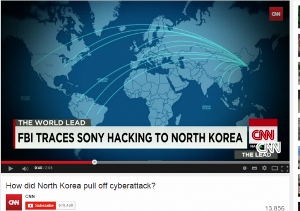
credit: The Intercept
MSNBC announced North Korea's culpability on Al Sharpton's program, where the host breathlessly touted NBC`s "breaking news" that the hackers were "acting on orders from North Koreans." Sharpton convened a panel that included the cable host Touré, who lamented that "that Kim Jong-un suddenly has veto power over what goes into American theaters." He explained that he finds this really bad: "I don't like that. I don't like negotiating with terrorists. I don't like giving into terrorists."
Bloomberg TV called upon former Obama Director of National Intelligence Dennis Blair, who said without any challenge that "this is not the first time that North Korea has threatened Americans." Blair demanded that "the type of response we should make I think should be able to deny the North Koreans the ability to use the Western financial system, telecommunications and system to basically steal money, threaten our systems." The network's on-air host, Matt Miller, strongly insinuated - based on absolutely nothing - that China was an accomplice: "I simply can't imagine how the North Koreans pull off something like this by themselves. . . . I feel like maybe some larger, huge neighbor of North Korean may give them help in this kind of thing."
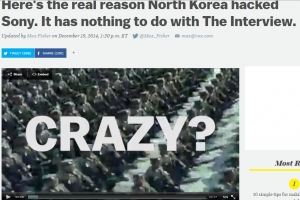
credit: The Intercept
Unsurprisingly, the most egregious (and darkly amusing) "report" came from Vox`s supremely error-plagued and government-loyal national security reporter Max Fisher. Writing on the day of Obama's press conference, he not only announced that "evidence that North Korea was responsible for the massive Sony hack is mounting," but also smugly lectured everyone that "North Korea's decision to hack Sony is being widely misconstrued as an expression of either the country's insanity or of its outrage over The Interview." The article was accompanied by a typically patronizing video, narrated by Fisher and set to scary music and photos, and the text of the article purported to "explain" to everyone the real reason North Korea did this. As Deadspin`s Kevin Draper put it yesterday (emphasis in original):
Here is Vox's foreign policy guy laying out an article titled, "Here's the real reason North Korea hacked Sony. It has nothing to do with The Interview." Never mind the tone (and headline) of utter certainty in the face of numerous computer security experts extremely skeptical of the government's story that North Korea hacked Sony. . . . Vox's foreign policy guy thinks he can explain the reason the notoriously opaque North Korean regime conducted a hack they may well not have actually conducted!
This government-subservient reporting was not universal; there were some noble exceptions. On the day of Obama's press conference, MSNBC's Rachel Maddow hosted Xeni Jardin in a segment which repeatedly questioned the evidence of North Korea's involvement. The network's Chris Hayes early on did the same. The Guardian published a video interview with a cyber expert casting doubt on the government's case. The Daily Beast published an article by Rogers expressly arguing that "all the evidence leads me to believe that the great Sony Pictures hack of 2014 is far more likely to be the work of one disgruntled employee facing a pink slip." He concluded: "I am no fan of the North Korean regime. However I believe that calling out a foreign nation over a cybercrime of this magnitude should never have been undertaken on such weak evidence."
Earlier this week, the NYT`s Public Editor, Margaret Sullivan, chided the paper's original article on the Sony hack, noting - with understatement - that "there's little skepticism in this article." Sullivan added that the paper's granting of anonymity to administration officials to make the accusation yet again violated the paper's own supposed policy on anonymity, a policy touted by the paper as a redress for the debacle over its laundering of false claims about Iraqi WMDs from anonymous officials.
But - especially after that first NYT article, and even more so after Obama's press conference - the overwhelming narrative disseminated by the U.S. media was clear: North Korea was responsible for the hack, because the government said it was.
That kind of reflexive embrace of government claims is journalistically inexcusable in all cases, for reasons that should be self-evident. But in this case, it's truly dangerous.
It was predictable in the extreme that - even beyond the familiar neocon war-lovers - the accusation against North Korea would be exploited to justify yet more acts of U.S. aggression. In one typical example, the Boston Globe quoted George Mason University School of Law assistant dean Richard Kelsey calling the cyber-attack an "act of war," one "requiring an aggressive response from the United States." He added: "This is a new battlefield, and the North Koreans have just fired the first flare." The paper's own writer, Hiawatha Bray, explained that "hackers allegedly backed by the impoverished, backward nation of North Korea have terrorized one of the world's richest corporation" and approvingly cited Newt Gingrich as saying: "With the Sony collapse America has lost its first cyberwar."
Days after President Obama vowed to retaliate, North Korea's internet service was repeatedly disrupted. While there is no conclusive evidence of responsibility, North Korea blamed the U.S., while State Department spokesperson Marie Harf smirked as she responded to a question about U.S. responsibility: "We aren't going to discuss publicly the operational details of possible response options, or comment in any way - except to say that as we implement our responses, some will be seen, some may not be seen."
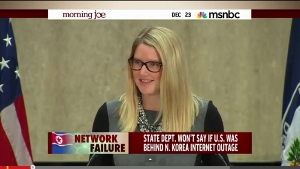
credit: The Intercept
North Korean involvement in the Sony hack is possible, but very, very far from established. But most U.S. media discussions treated the accusation as fact, predictably resulting in this polling data from CNN last week (emphasis added):
The U.S. public does think that the incidents which led to that decision were acts of terrorism on the part of North Korea and nearly three-quarters of all Americans say that North Korea is a serious threat to the U.S. That puts North Korea at the very top of the public's threat list - only Iran comes close. . . . Three-quarters of the public call for increased economic sanctions against North Korea. Roughly as many say that country is a very serious or moderately serious threat to the U.S.
It's tempting to say that the U.S. media should have learned by now not to uncritically disseminate government claims, particularly when those claims can serve as a pretext for U.S. aggression. But to say that, at this point, almost gives them too little credit. It assumes that they want to improve, but just haven't yet come to understand what they're doing wrong.
But that's deeply implausible. At this point - eleven years after the run-up to the Iraq War and 50 years after the Gulf of Tonkin fraud - any minimally sentient American knows full well that their government lies frequently. Any journalist understands full well that assuming government claims to be true, with no evidence, is the primary means by which U.S. media outlets become tools of government propaganda.
U.S. journalists don't engage in this behavior because they haven't yet realized this. To the contrary, they engage in this behavior precisely because they do realize this: because that is what they aspire to be. If you know how journalistically corrupt it is for large media outlets to uncritically disseminate evidence-free official claims, they know it, too. Calling on them to stop doing that wrongly assumes that they seek to comport with their ostensible mission of serving as watchdogs over power. That's their brand, not their aspiration or function.
Many of them benefit in all sorts of ways by dutifully performing this role. Others are True Believers: hard-core nationalists and tribalists who see their "journalism" as a means of nobly advancing the interests of the state and corporate officials whom they admire and serve. At this point, journalists who mindlessly repeat government claims like this are guilty of many things; ignorance of what they are doing is definitely not one of them.

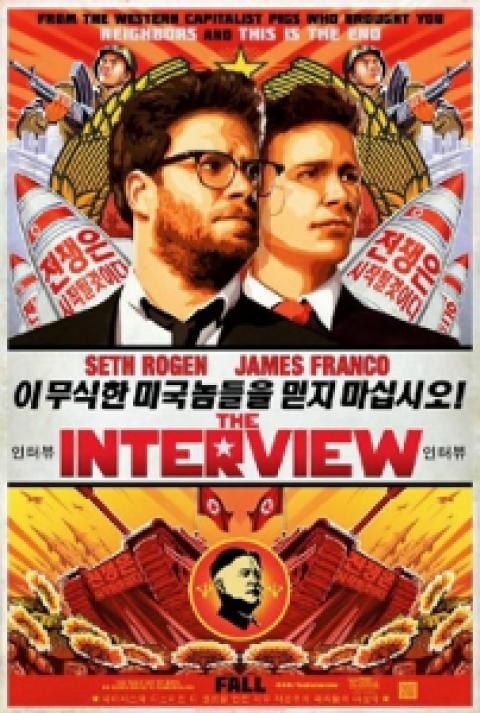
Spread the word